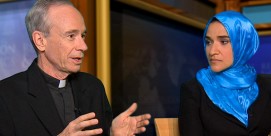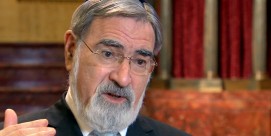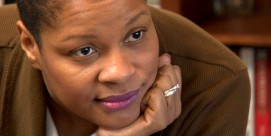In This Episode << SLIDE LEFT TO SEE ADDITIONAL SEGMENTS
Sam Harris Extended Interview
Read more of the November 18, 2006 R & E interview with Sam Harris, author of THE END OF FAITH and LETTER TO A CHRISTIAN NATION:
Q: What do you have against religion?
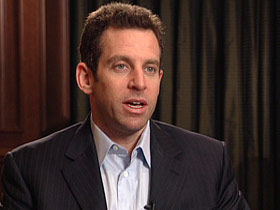
A: It’s not so much religion per se, it’s false certainty that worries me, and religion just has more than its fair share of false certainty or dogmatism. I’m really concerned when I see people pretending to know things they clearly cannot know. I’m especially concerned when these certainties are operative at the level of our national discourse, at the level of the kinds of motivations people find to not do certain kinds of medical research, or not fund it, like stem cell research, the kind of motivations people find to go to war, to blow themselves up in certain circumstances we see in the Muslim world. These are ideas that really are operative and translate into behavior and emotion inevitably. I think there’s a myth in our society that belief is private. Belief is only private if it’s not really believed and it’s not making a point of contact with the world. But if your beliefs are about the world on any level, they are engines of behavior and emotion, so then it really matters what people believe is going on. If they believe the creator of the universe wants all human beings to live in a certain way, their beliefs are going to find a way into the public sphere, and no amendment to our Constitution is good enough to keep it out.
Q: What’s the best example of the harm religion can do?
A: There are so many examples. The obvious examples of violence that would not otherwise occur but for what people believe about God –for instance the conflict in the Middle East. We have Muslims and Jews by and large making incompatible claims upon specific real estate in the Middle East, believing that God is an omniscient real estate broker who has doled out these parcels of land as witnessed by the Bible or the Koran. My argument is that really we have a situation here where people have defined themselves in religious terms, they have made incompatible claims on real estate, and they are fighting for God. It’s nominally over land, but the only reason why they can’t live happily side by side there is because they believe incompatible things about the nature of the universe based on their faith.
Q: Do you see the harm in religion manifesting itself in our government?
A: Yeah, on many levels. The fact that we are not funding stem cell research is an explicitly religious constraint upon our medical research. This is the effect of having millions of people, one of whom is the president of the United States, believing that the human soul enters the zygote at the moment of conception and therefore you can’t privilege one soul over another, even if one of those souls happens to be in a petri dish and the other soul is a little girl with a spinal cord injury. This seems to be an ethical dilemma which requires strenuous debate to resolve, and at the moment the debate has been resolved on the side of let’s do nothing. Let’s not fund this research.
Q: Do you think our country is in the trouble it’s in because of religion?
A: To a large degree I think it is. I think it could be in much more trouble. I think we could have a country that is really explicitly in a religious war with the whole of the Muslim world. I feel like we are meandering into that now in the way we are conducting our foreign policy, but it could have been worse. We could have had someone like Pat Robertson in the Oval Office as opposed to George Bush. I think George Bush is sufficiently irrational in his beliefs about the world based on his evangelical Christianity that it worries me, but he’s not nearly as scary as some of the people who put him in office, some of the people who really think they are going to be raptured in their life time. Grown men and women really believe this stuff, and it really has consequences.
Q: Many religions people feel they need their religion, that it sustains them, comforts them, gives them solace, makes them better people. What about that?
A: It’s actually not an argument for the truth of any specific religious doctrine, and we recognize this easily on any other subject. The usefulness of religion, the fact that it gives life meaning, that it makes people feel good is not an argument for the truth of any religious doctrine. It’s not an argument that it’s reasonable to believe that Jesus really was born of a virgin or that the Bible is the perfect word of the creator of the universe. You can only believe those things or you should be only able to believe those things if you think there are good reasons to believe those things. It seems to me that either the Bible is a magical book or it isn’t. Either it is the word of God or in some sense a unique book, unlike any other book, not the product of mere human beings, or it’s a book like any other book — well written in parts, not so well written in other parts, very inspiring in parts, not so inspiring in other parts. I happen to think it’s a book like the plays of Shakespeare and the Iliad. It’s literature. If it is just a book, if you are a religious moderate who is not being a literalist about it, and you’re willing to acknowledge that it’s a book that has a lot of wisdom in it, there is no impediment to taking that wisdom and using it as part of our twenty-first century conversation about ethics and meaning and the nature of the universe. So we can take the golden rule out of the Bible and say this is about as wise as it gets. We want to use the golden rule; it is supremely useful. It captures our ethical intuitions on so many questions. It’s not unique to the Bible, incidentally. Other people have come up with the golden rule. So the golden rule is great, let’s keep it, but let’s jettison all the barbarism we have in Leviticus and Deuteronomy and stoning people for working on the Sabbath or killing a girl who is not a virgin on her wedding night. This we recognize is barbarism. We can do that. We don’t have to get rid of all the buildings, the art or the music. What we have to get rid of are these divisive certainties that separate, that fracture the human community into these separate moral camps, where we have Muslims siding with other Muslims reflexively because they are Muslim, and Christians likewise, and Jews likewise. We have to find a way to a future somehow where we are simply human beings talking very much in the way we speak in science about just the way the world is, in a way that just floats free of culture and country. There’s no such thing as American science as opposed to French science as opposed to Japanese science. There’s just science. There’s no such thing as Christian science as opposed to Muslim science, and ultimately I think there is going to be no such things as Christian morality or Christian spiritual experience. There is going to be morality and spiritual experience, and it is going to be part of a truly nondenominational conversation we have in the modern world.
Q: Do you believe that there will be a time when religion goes under? Is that what you are saying?
A: Yeah, I think that there must be. It’s hard to imagine that 500 years from now we are going to be happily living side by side, devout Muslims and devout Christians armed with unimaginably destructive technology. Already our technology is getting so destructive and is proliferating so readily that I think it is increasingly obvious that there’s no future where aspiring martyrs are going to make good neighbors for us. If you are not deterred by death, if you think death is the best thing that can ever happen to a person in the right circumstances, as millions of very committed religious people believe, you have ceased to be a rational actor in world affairs, and given the right destructive technology, which as I said is proliferating — we are not stopping proliferation — I think it’s a deal breaker. We are not going to get a hundred or a thousand years into the future still holding on to our separate identities in this way.
Q: Are you saying either we give up religion or we are all going to kill each other?
A: I think we are killing each other. It’s not the only reason why we are killing each other, but it is a reliable reason. There would be sources of war without religious dogmatism, but the scariest of us-them thinking at the moment, and I would argue historically, has been these divisive religious certainties. There are so many conflicts, principally between Islam and her neighbors at the moment, which are being generated purely on the basis of what people believe about God, only nominally on the basis of material concerns and economics. Literally we have a circumstance where in the Muslim world disproportionately well off and well educated people are blowing themselves up and forming these jihadist cells, and we have physicians organizing terrorist cells. It’s not an easy equation between ignorance and religious extremism. That is a scary fact — that it is possible to be so well educated you can build a nuclear bomb and still think you are going to get the 72 virgins in paradise. That marriage of twenty-first century sophistication and medieval religious credulity, I think, is something we have to keep our focus on it, because it’s just a true pathology of discourse, because certain beliefs about God and the afterlife are just immune to criticism in our discourse, and we have to find some way of changing that.
Q: Do you really think people are going to give religion up? It is so pervasive. What will make millions and millions of people stop being religious? Is that a realistic hope or a good hope?
A: It seems incredibly quixotic in our society where 90 percent of people believe in God, 87 percent of Americans claim to never doubt the existence of God, according to one Gallup poll. But if you just compare us to the rest of the developed world. Western Europe is profoundly secularized compared to us, apart from their Muslim immigrants. Western Europeans view us as a religious backwater.
Q: Why are we different from them? Why has this secularization happened in Europe and not here? Why are Americans so religious?
A It’s a question for which I don’t think anyone has put forward an adequate answer. There are some ideas about the difference between having a thriving marketplace of competing denominations, which we have in the States, and state religions by and large in Western Europe, where the state religion becomes kind of moribund and boring and just ceases to be a vibrant domain for religious people, whereas here anyone can put up a shingle and argue that their religion is the best religion, and we have this marketplace of ignorance, I think.
Q: You have likened religious people to lunatics. Explain that.
A: I think most people would agree that you have to be a lunatic to be certain of Poseidon, for instance. If someone was going to run a political campaign and as part of their stump speech they said these hurricanes in the Gulf have become an increasing concern, and we have to start praying to Poseidon, the god who deals with the ocean. This is a manifestly crazy thing to say. Everyone would recoil, it would be the end of that person’s political career, and yet we are talking as though there was some epistemological difference between talking about Poseidon and talking about the God of Abraham, and I would argue that there really isn’t, apart from numbers of subscribers. I actually get hate mail from people who really do believe in Poseidon. It’s not impossible to believe in Poseidon. But it is so fringe an object of fixation that everyone immediately recognizes it as being in some sense basically unreasonable. My concern with religion is that it allows us by the millions to believe what only lunatics or idiots could believe on their own. That’s not to say that all religious people are lunatics or idiots. It’s anything but that. There are some very smart, perfectly sane people who believe these things. And that is what is so scary about our discourse. I think Osama bin Laden is both intelligent and psychologically healthy. I do not think he’s crazy. He would not fit on any spectrum of pathology that we have, in psychodynamic terms. Maybe he’s got some grandiosity, but basically he is a very well integrated person who could be doing anything he wants with his life and his talents, but he wants to be living in caves, scheming about how to kill infidels given what he believes about God. And it is rational for him to do that given what he believes about God. So what concerns me is that it is possible to be even a good person. A lot of these jihadists are probably not evil people. There are people who are evil in this world. There are people who are sociopaths, who don’t feel compassion, who want to harm children, etc. But there are people who are good people who will fly planes into buildings given the right circumstances, given what they believe, and that is the scariest situation of all.
Q: So you are saying that religion can turn people into sociopaths?
A: Yeah, effectively so. While I believe that they feel genuine compassion and concern and genuine religious ecstasy — I think for instance that a suicide bomber before he pushes the button is probably in a very transfigured state that is incredibly positive at the level of his emotions. I’m sure if you could check in with him at that moment, you would find that he would feel his entire existence had summated to this moment, and he will feel just incredible meaning and probably rapture.
Q: Because of his religious beliefs?
A: Yeah, and because he is putting it all on the line. He is sure of paradise, he’s sure he’s going to get all his loved ones into paradise, he’s sure this world is a sacrilegious mirage, and he has no doubts.
Q: There are religious people who will say that religion is the best, some will say the only way to teach morality. What about that?
A: I think that is delusory on many fronts. One is that these are not the most moral books that we have. The Bible for instance endorses slavery. If the Bible is the best book we have on morality, it should get slavery right, because slavery is one of the easiest and most consequential questions we have ever had to face, and the Bible gets it wrong. God tells us how to keep slaves, he tells us not to beat them so badly that we knock out their eyes or their teeth, but he tells us to keep them, and Jesus clearly expected us to keep slaves, so that alone rules out the Bible as the best source or morality. When you look more specifically at what people claim to be the basis of morality in the Bible, like the Ten Commandments, you find that the first four have nothing to do with morality: Have no other gods before me, no graven image, keep the Sabbath holy, don’t take God’s name in vain. These are theological crimes, the penalty for which is death. You are supposed to kill people for working on the Sabbath in Leviticus and Deuteronomy and Exodus. We live in a country where 75 percent of the people think that those commandments should be on our public buildings. Perhaps they want the penalties for breaking them on the public buildings, too. This is just not the most articulate source of morality we have.
Q: What evidence is there that people would be as moral without religion?
A: There is much evidence. One is that clearly morality not only precedes exposure to religion, it precedes our humanity. We can find the precursors of moral behavior in other mammals. Mice have been shown to be more agitated at the suffering of familiar mice than unfamiliar mice. Monkeys will starve themselves so that their cage mates don’t get shocks, whereas they won’t do that if their cage mate happens to be a rabbit. If it’s another monkey they are concerned, if it’s rabbit they are not. These are the kinds of things you would expect to find in the natural world if our morality were coming out of evolution or biology on some level, and then you can just look at the behavior of religious people and atheists. You go to the National Academy of Scientists, and this is effectively an atheist organization. Ninety-three percent of its membership rejects the idea of a personal God and seventy-one percent would be strictly atheists by any definition. These guys are not raping and killing and stealing. If religion were somehow necessary for morality, wherever you found an atheist you would find an immoral person, and I think the opposite is the case. I would bet if you went to the prisons in this country you would not find a high percentage of atheists, and you would probably find a lower percentage of atheists.
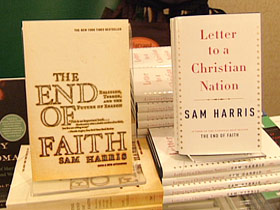
Q: What brought you to all this?
A: The short answer is Sept. 11. I wrote THE END OF FAITH as an immediate response to Sept. 11. The moment I saw that we were being attacked for religious reasons and because of our own attachment to our own religious traditions we weren’t going to call a spade a spade, we weren’t going to admit that this was a religious act, and in fact that the only language we could find at that moment to console ourselves was our own religiosity. We talked about God being on our side. George Bush stood up and said God is not indifferent between freedom and fear. We went for refuge in the very thing that was bringing us this atrocity, in this irrational faith, this commitment to false religious certainty.
Q: You say in your book that Christians are highly immoral by inflicting unnecessary suffering on human beings. Can you explain that?
A: There are many examples of immorality born of religious belief. The obvious case is suicide bombing, but then there are the less obvious cases, where you have a dogma like contraception is a sin. This is something that Catholics hold very dearly and that the Vatican still promulgates. This seems like a benign idea. It seems like it’s not going to cause too much suffering in the world. It will maybe cause overpopulation, but it’s not evil. And yet you go to sub-Saharan Africa and you learn that there are Christians preaching the sinfulness of condom use in areas where people are literally dying every year by the millions from AIDS, and the only information they have about condom use is the representation of the ministry. To add even greater culpability they then preach the necessity of believing in Jesus Christ in regions where conflict between Christians and Muslims, religious conflict, has also led to the death of millions, so this is like a two-fold religious stupidity which is getting people killed, and we really can’t criticize it to the degree that we otherwise would because it’s coming under the aegis of faith, because it’s the Vatican and Christianity in general that are endorsing this.
Q: Can a person be spiritual without being religious?
A: There is no question that people have this range of positive experiences that tend to be accessed through certain uses of attention, through meditation and prayer and yoga and other disciplines which can be incredibly transforming and useful and desirable and worthy of our study, worthy of our personal experience, and worthy of our scientific study. I’m very interested in meditation. I’ve spent a lot of time practicing meditation. I’ve organized retreats for scientists where a hundred neuroscientists have gone into silence for a week and meditated eighteen hours a day just to see what can be revealed through disciplined use of attention, through introspection, and to see how it can inform our study of the mind. So I think there’s no question that there is room for a very vigorous first-person exploration of our subjectivity, and we can call that spiritual for lack of a better word, because it really does reveal self-transcending insights. It is the wing of experience accessed by people like Buddha and Jesus and the millions of contemplatives who have practiced in any one of our religious traditions.
Q: How are atheists most misunderstood? What should people know that they don’t know about you?
A: They should know that the very term “atheist” is not necessary. There are many atheists who would never dream of calling themselves atheists or join an atheist society or otherwise organize themselves. We don’t have a word for not believing in Zeus, which is to say we are all atheists in respect to Zeus. And we don’t have a word for not being an astrologer. Nobody gets up in the morning and says I’m not an astrologer, I’m not an astrologer. This is just not a variable around which people gather. Ultimately the point of view of atheism is really one of — atheism is just the disgruntled noises people make in the face of religious dogmatism. It’s really reason and a demand for evidence in the face of religiously sanctioned false certainly. I’ll be very happy when we retire the term “atheist,” and I think it is a word destined for disuse because if atheists win and we all just achieve a level of intellectual honesty where we are no longer going to pretend to be certain about things we are not certain about, then we’ll just be open-minded, rational, scientifically inclined people who will talk about spiritual experiences honestly, talk about ethics honestly, talk about the shape of the universe honestly, and it won’t be a word.
Q: Talk about your own religious — or nonreligious — journey.
A: I’ve spent a lot of time practicing meditation, mostly in an Eastern context, a Buddhist context. I’ve probably spent two years on silent meditation retreats where you don’t read, you don’t write, you don’t talk to people. You just practice meditation. The one thing that has come out of that is I have no doubt about the fact that you can use your attention in various ways that really transforms your experience very much for the better.
Q: Where did you start out with respect to religion? Were you brought up religiously? What is your history?
A: I have an unremarkable history. I don’t have a religious upbringing that I’m rebelling against. I had a totally secular upbringing and was just encouraged to explore things as I saw fit. I was never raised an atheist as opposed to religious. It just was not an issue. In my teens I just got interested in spiritual experience and what happens after death and just began to see that religion is really the discourse that treats these phenomena and started exploring meditation and other specifically Eastern brands of religious thinking, but I have studied Western religion as well and have been interested in religion for decades.
Q: When did religion start to turn you off?
A: Dogmatism has always turned me off. I’ve always thought that you could have spiritual experience very much in the spirit of science, which is to say never feel the temptation to pretend to be certain about things you are not certain about. It really was 9/11 which woke me up to the liabilities here, that we are just not challenging peoples’ religious certainties, and these certainties are active in the world.
Q: Why don’t you think that God exists?
A: It’s like asking why don’t you think Zeus exists. It’s not that I can prove the absence of Zeus. I just know that there’s not good evidence for Zeus. No one has put forward anything that would suggest that Zeus exists.
Q: But people will say what do you mean? The sky, the trees, the birds, the flowers, the humans. Isn’t that evidence that God exists?
A: It’s really not. It is evidence of a bewilderingly complex creation, the origin of which remains a mystery, and it remains a mystery to every specific science that treats it. Cosmologists will tell you we don’t know how the universe came into being. There is nothing wrong with not knowing that. The irony here is that religious people think scientists are being arrogant for ruling out God. The arrogance is very much on the other side. It’s arrogant to put God in the place in a genuine mystery. It’s the scientist who says he doesn’t know. The religious person claims to know that God did it, “and I have a book that is the perfect word of God and will be perfect for the rest of human history, and if you don’t believe what I believe, you are going to spend eternity in hell.” That is an arrogant system of claims. Scientists simply say they don’t know when they don’t know, and that, I think, should be encouraged at every level of culture.
Q: Except for the religious scientist.
A: Whose intellectual honesty I think has been coopted by their emotional attachment to their religion.
Q: Does a belief in God cause people to do good?
A: No. It may sometimes, but in those cases I think it’s causing them to do good for bad reasons. We can have good reasons to help other people, and we can have bad reasons to help other people. It’s worth pointing out that it is rather more noble to help people because you are concerned about their suffering than it is to help them because you think the creator of the universe wants you to do it or will punish you for not doing it. We can become sensitive to the suffering of other human beings and really be motivated by that sensitivity. Compassion is a real principle of human psychology which can be encouraged and even trained. We can become more compassionate than we naturally are by actually, deliberately paying attention to the suffering of the world and thinking about our entanglement with other people.
Q: So much of the teaching of religion has to do with doing good.
A: Not all that much. It has to do with the kinds of things God will object to. Take our debate about gay marriage. What does that have to do with doing good, or what does that have to do with the alleviation of human suffering? What we have here are millions of Americans who are concerned with what their neighbors do in the privacy of their own bedrooms because they think the creator of the universe is going to be offended with something they do while naked. It’s a mind boggling allocation of our moral resources.
Q: You have a problem not only with religious fundamentalists but also with religious moderates. Why is that?
A: Because when you look at how religious moderation functions in our society it provides cover for religious fundamentalism. Because we can’t criticize religious faith because religious moderates are attached to their faith, we therefore can’t criticize the faith of fundamentalists. Religious moderates are continually saying it’s not religion doing this, it’s bad people doing this, or it’s economics, or it’s politics functioning with religions as an excuse. It’s just not true. It is people taking their religion far more seriously than moderates take it. It’s people willing to die for their religious certainties.
Q: So what do you think religious moderates should be doing?
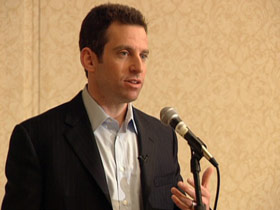
A: I think religious moderates have to admit where their moderation is coming from, and it’s not coming from inside the faith. It’s not like they looked more closely at the Bible or the Qur’an and found all these reasons to be moderate, because they didn’t. God is not a moderate. And there’s no place in the Bible where it says when you get to the New World and develop your three branches of government, just jettison all the barbarism in Leviticus and Deuteronomy because a far more moderate discourse will be necessary. Moderates aren’t being honest about the fact that their moderation is coming from outside the faith, from secular politics and scientific progress, that it’s just working on their faith with hammer blows, and once they acknowledge that, they will see they really should be open to rational discourse across the board, and everything should be on the table to be revised, including their spiritual certainties. And nothing will be lost, ultimately, apart from delusion and divisive reasons for us to be separate from one another.
Q: Don’t people need their, what you call “delusions”?
A: I don’t think so. I think it’s an amazingly well subscribed myth that other people do need their delusions. I can’t tell you how many people have said to me, “I don’t need religion; my family doesn’t need religion. But everyone else does, and so therefore it is wrong for you to criticize it.” You can’t take away people’s hope is something that many atheists are convinced by, and yet it’s a very weird kind of condescension and paternalism that everyone else needs this tissue of lies and fables, but only you are strong enough to live without it. I just think it’s not true, and the fact that there are societies so different from our own, like in Western Europe — I mean, 60 to 80 percent of Swedes are atheists. What’s going on over there? Do they have different genes than we have? No, it’s that they are having a different conversation.
Q: You have faith in science in terms of what is true and not true. You say science represents our best efforts to know what is true about our world. Religious people will say yes but life is not all science.
A: I wouldn’t say that life is all science, but life need not be lies and self-deception either. You don’t have to prove scientifically that you love your wife. But there is nothing irrational about loving your wife, and there is nothing that need be presumed on insufficient evidence in order for you to love your wife or value the experience of love or want to surround yourself with people you love. All of that is perfectly compatible with rationality. It only becomes irrational when you are clearly making strong claims about the universe on bad evidence or despite mountains of contrary evidence. I don’t think there is an opposition between reason and emotion in that way, or between reason and love or any of these other strands of our subjectivity that we value. No one is suggesting that you have to perform a controlled study in order to figure out whether you love your kids or others close to you.
Q: Why do you think your message is important today?
A: It’s astonishing to me how rare this message is, just what an anomaly this way of speaking is. I think it will ultimately disappear as even a relevant thing to say in the same way that we certainly no longer talk about the problem of slavery the way we used to, and yet at some point it would have seemed profoundly irrational to expect slavery to end. It was just obvious that slavery wasn’t going anywhere. These people were not equal. Blacks were not equal to whites. They couldn’t read, for instance. It was obvious that we were economically dependent upon slavery, and there were so many good reasons to keep it around. To be an abolitionist in the year 1750 and say we are going to get rid of this thing would have seemed almost a delusional kind of optimism. I think we are in the same place with respect to religion. I think we are going to look back on our discourse at some point in the future and just think it to be shockingly anachronistic that we wasted the time we wasted on these projects and that we allowed our world to become so divided by these ideas.
Q: Were you surprised by the success of your books and do you feel that somehow America is changing around you, that there is more interest and tolerance for nonbelievers than there used to be? If so, what has made this happen?
A: I was certainly surprised by the success of the first book. There was just no reason to expect it to succeed that way. I was less surprised by the success of the second, because it was just launched from the shoulders of the first, really. I don’t know if we are having a new moment in our discourse. There are some visible best sellers that take a very hard stance against religion, but I don’t know that it signifies any change of the tide. I’d like to think so, but I think it’s far too soon to say that religion is on the wane on any level in this society.


